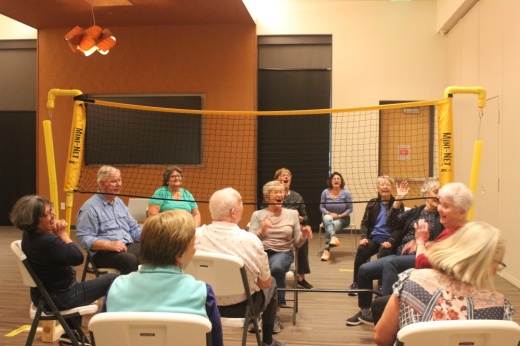Seniors make up a portion of both Lewisville and Coppell’s populations. According to the 2020 U.S. Census Bureau data, 8.3% of Lewisville residents are age 65 and older, while 8.9% of Coppell residents are age 65 and older.
People are living longer, therefore the senior population is growing rapidly in the U.S., according to the U.S. Census Bureau. The age-65-and-older population grew by over a third during the past decade, according to 2020 U.S. Census data.
Longer life spans, higher costs of living and a growing senior population have led to the need for more affordable housing options, which is one of Lewisville City Council’s top priorities, Council Member Ronni Cade said.
“It’s incumbent on policymakers as a whole on every single level—local, all the way to federal—[to seek] affordable and accessible housing, and [to have] a community that welcomes and wants to flourish the support systems for long-term aging,” she said.
Coppell officials are also trying to find senior housing solutions, which includes gathering community input. The goal is for Coppell to be a desirable location to age in place, Director of Community Development Mindi Hurley said.
“The city’s taken [senior housing] to heart,” she said. “There are more people that want to stay here. The••commitment to providing what is needed is truly there.”
Housing challenges
Lewisville and Coppell’s senior residents have different housing needs.
The lack of affordable senior housing has turned into a crisis in Lewisville, Cade said.
More than half of Lewisville residents are renters, and about 40% of households in Lewisville that rented in 2018 were either cost burdened or severely cost burdened. To compound the issue, rent increased by 18% between 2020-21, according to city data.
According to a July report by United Way of Denton County, 9.7% of Lewisville’s senior population lives below the poverty line.
Inflation has strained finances for seniors, many of whom are on fixed incomes, Cade said. Housing that is affordable, accessible and in proximity to key resources, such as public transportation, is critical, she said.
“They are paying, most of the time, well over 30% of their total income on housing,” she said.
Lewisville’s Neighborhood Services Manager Ashleigh Feryan said she has seen more requests for assistance in the past year due to rising inflation.
“When it comes to food and other services, [seniors are] really having to prioritize rent versus food or medication,” she said.
Senior housing is also a priority in Coppell, Mayor Wes Mays said. Exploring new housing options for its senior population is included in the city’s Vision 2040 Strategic Plan.
“One of the things that our [Vision] 2040 plan showed was that seniors are a very important part of our community, and senior housing was a big part of that,” Mays said. “The City Council had looked at senior housing for years and had never really been able to come up with a plan on how to handle senior housing as an activity.”
Aging residents have stated a desire to downsize and remain in Coppell, but the lack of suitable housing has forced them to consider moving to nearby communities, according to feedback gathered by the city. There are five senior living facilities in Coppell ranging from nursing homes to mixed-use facilities.
“We don’t have any spare dirt to build on,” Mays said. “The cost model for building an affordable type of senior housing gets very difficult to do. It certainly does impact the type of facilities that we could entertain.”
Lewisville’s senior housing solutions
The Lewisville council moved forward to help resolve its affordable senior housing issue over the last few months.
The council approved a zone change request in August that will allow the development of a new senior living community. The age 55-plus property will be located at 1727 S. Edmonds Lane and is anticipated to offer one- and two-bedroom units. An opening date has yet to be determined.
Effective Dec. 1, accessory living dwellings will be permitted. Backyard homes will provide a more affordable solution for seniors and allow them to remain in close proximity to their families, Cade said.
An in-depth housing study will begin soon, which will be a part of the city’s housing strategy plan. The plan is anticipated to be completed by early spring 2023, Feryan said.
"We’re going to be ... really looking at what affordable housing means here in Lewisville. What does it look like, and what are some tools beyond [Community Development Block Grants] and what our current funding sources are, and partners that we could be bringing to the table to preserve and bring more affordable housing to Lewisville,” she said.
While the city has taken steps toward providing relief, Cade said solving the affordable senior housing crisis is a long-term effort.
“It didn’t get broken overnight, and it’s not gonna get fixed overnight. It has to remain a top priority for whoever’s sitting [on the council] voting on any of these issues,” she said.
Coppell’s holistic approach
The city of Coppell is taking a different approach to senior living, Mays said.
“We look at it more as a citywide holistic approach. Our city slogan is ‘a family community for a lifetime.’ And we take that very seriously,” he said.
Shortly after the Vision 2040 plan was adopted, Coppell’s Future Oriented Approach to Residential Development task force was formed.
The FOARD board is tasked with studying senior housing and proposing new options. One of the proposed solutions is the creation of a village, which would be a community within a community potentially located at Coppell’s Senior and Community Center. Villages are community-based, nonprofit, grassroots organizations that connect members to a wide array of practical support services and build a sense of community, according to Village to Village Network. There are more than 250 villages in the United States.
A formal presentation of the village will be provided to the council in 2023, said Hurley, who serves as the board’s staff liaison. FOARD is preparing to launch a housing survey to gather community feedback. The survey will primarily focus on senior housing and is anticipated to begin in January, she said.
Some of the housing solutions discussed, such as granny flats, would require changes to the city’s ordinance. Hurley said community input will be key to identifying what specific housing options would be best and should therefore be proposed to council.
Jennifer Millman, a Coppell-based senior real estate specialist, said she has seen more diversity in senior living options over the years.
“It used to be like it was only a nursing home was the only option,” she said. “[There are] so many more options for freedom for seniors.”
Millman said many of her clients have been drawn to independent living facilities. She said those communities are popular, because they are often more affordable than assisted living facilities, which require nursing staff and other services.
Long-term solutions for senior housing are in the early stages, but officials are committed to providing what residents need, Hurley said.
Mays said he cannot predict what senior housing will look like in Coppell, but he believes it will be unique.
“It’s gonna be different just based on our community and our residents. I don’t think you’re gonna see the traditional senior environment,” he said. “I’m very excited about what the FOARD board will turn up for us.”






